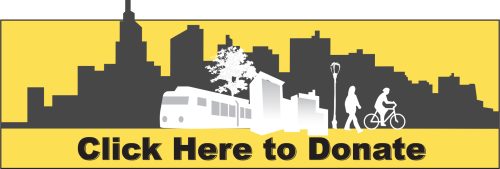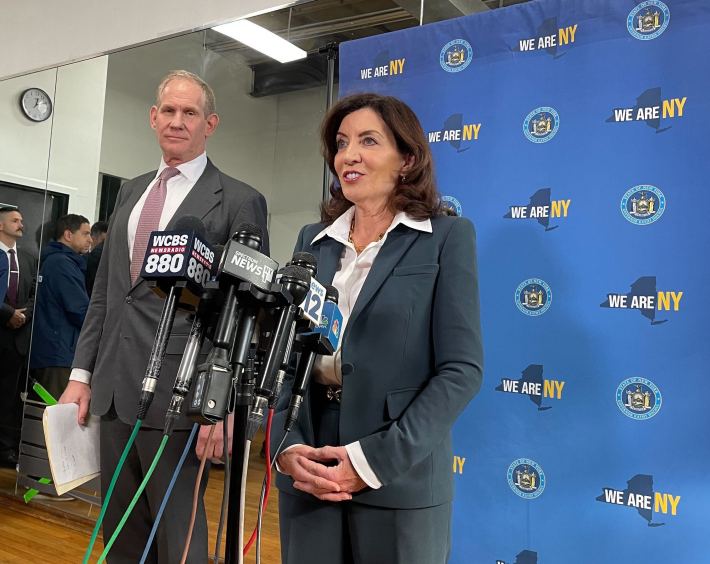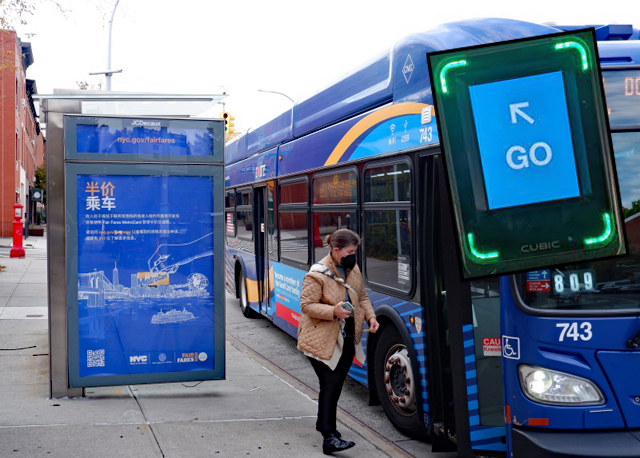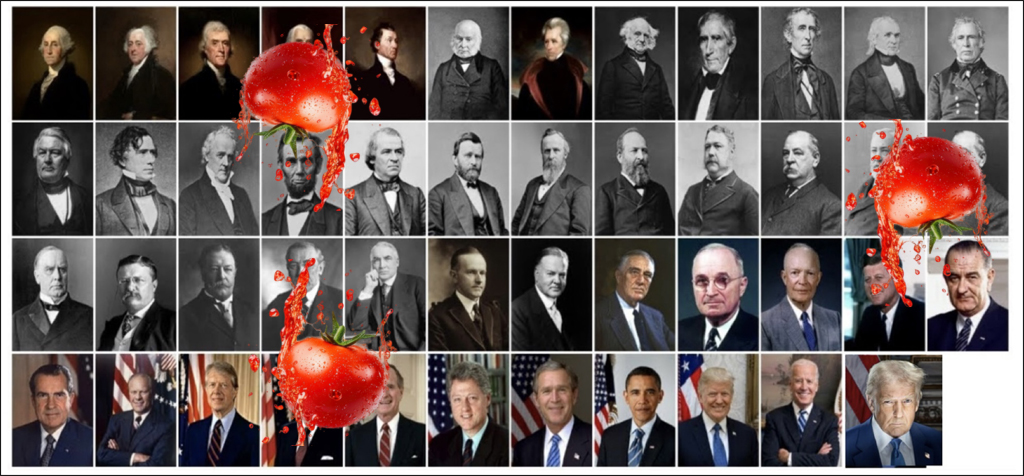
Two Queens state lawmakers revealed a financing plan for free buses in New York City on Wednesday, staking out their spot before Albany's budget dance starts in January next year.
Assembly Member Zohran Mamdani (D-Queens) and State Sen. Michael Gianaris say their four-year plan to gradually eliminate fares on local buses and Select Bus Service proposes yearly funding escalating from $200 million in 2023 to $638 million in 2026.
"The idea is to be bold, and make the point that this incrementalism that we've been using to support the MTA is not working," said Gianaris. "We need to go big enough to support the mass transit system because it affects every aspect of our lives. Housing is conditioned on having access to mass transit, education is conditioned by it, public safety is conditioned on it. It's the spine of the city, and we need it to be healthy."
The four-year process would begin with free buses in the Bronx in year one, followed by Brooklyn the next year, Queens in the third year and Manhattan and Staten Island in the fourth year. The sequence is based on a Community Service Society study of median household income, poverty rates, share of commuters and bus riders in each borough according to Mamdani and Gianaris.
In addition to the free buses, the legislators' spending bill comes with $488 million per year for 20 percent more bus service, an escalating amount of money $114 million in 2023 rising to $360 million in 2026) for a four-year freeze on fares and $300 million per year to run subways every six minutes during off-peak hours.
Mamdani and Gianaris are calling their bills the Formula Three Act, for the three F's of freezing fares, funding frequency and free buses, and they say that when fully up and running, the state can fund free MTA buses for $638 million. The package also includes legislation previously introduced by State Sen. Liz Krueger and Assembly Member Alicia Hyndman that would expand the MTA's ability to do camera enforcement in bus lanes and ensure the ABLE camera enforcement system is made permanent.
"This is an urgent and a necessary demand," said Mamdani. "And it's not one that should be thought of as a wishlist come to life. This is in response to the conditions that New Yorkers are facing right now. We should not separate free buses from freezing fares and funding frequency. Those three things are tied together, most especially frequency and free buses."
The bills will mean that New York, which even in a post-shutdown world still has more people riding the bus than any transit system in America, will throw its fitted Yankee cap in the debate over free bus service that's currently gripping more and more cities. Kansas City has run a free bus service since 2020, and Boston expanded its free bus pilot from one route to three routes in 2022.
The Washington City Council recently voted to make its entire bus system free starting in July, and Los Angeles Mayor Karen Bass is considering whether to embrace fare-free transit in her city. Even if New York won't be the first, it would be the biggest city to embrace free buses, which Gianaris said is a good reason to prove it can be done.
"This is a big debate going on in the mass transit world. Boston is implementing a pilot program but New York always does everything bigger and better. So we have the chance to shape the policy beyond just our own borders," he said.
The ongoing push for free transit has raised the hackles of urbanists and transit thinkers who point out, as they have in the past, that riders frequently don't even ask for free bus service as much as they ask for better and more frequent bus service. In a recent piece for The Atlantic titled simply "Buses Shouldn't Be Free," Jerusalem Demsas compared fare-free buses to putting a fresh coat of paint on a crumbling public library and said that the idea is a symptom of urban politicians who don't know how to govern.
"I also suspect that the push for fareless transit is downstream of a larger failure: American urban elected officials have struggled to improve government services, especially infrastructure development," she wrote. "[I]f the goal is to give money to low-income people, we should give money directly to low-income people. If the goal is a well-functioning transit network, we should fix the problems that bus riders tell us are plaguing the system."
Despite this critique, Mamdani said that the proposals for free buses, increased service and bus lane enforcement are not all together in the package as a specific rebuke of urbanism discourse.
"It's not actually a response to that discourse, though, that discourse has been informative in the way that people think about this. It's more of a response to what is the quality of service right now. I live on Broadway in Astoria, the bus that we have goes about five miles per hour. We need faster buses, we need more frequent buses and at the same time, we also need to ensure that seniors working class New Yorkers, people who use the bus the most are able to do so without fear of being priced out," he said.
The Astoria rep also mentioned what he said was a weakness of the city's half-price Fair Fares program, which has struggled to attract enrollees even as the MTA plans to fold it into OMNY's tap-and-go payment system.
"Oftentimes when you talk about providing relief to the New Yorkers who need it the most, you start to hear proposals around means-tested programs. But last year, the Community Service Society found that 48% of eligible New Yorkers had not applied for the Fair Fares program. If we want to make an impact on the lives of working class New Yorkers, we have to do so in a manner that does not require them to apply for something all it must require them is to simply use the service," he said.
Mamdani also compared free bus service to the state's ill-fated gas tax holiday, which mostly enriched gas companies under the guise of providing relief to New Yorkers.
"In a moment where New Yorkers are being crushed by inflation, you often hear people talk about how we need to see relief at the pump, which is why New York State spent $500 million last year waiving the gas tax for six months. What we are talking about here is providing relief at the farebox when people board the bus," he said.
The MTA previously ran free bus service during the early days of the coronavirus pandemic, driven in part by a desire to give bus drivers a separation from riders and also by the fact that OMNY readers were not installed on every bus when the pandemic began, which ruled out rear door payment anyway. When buses were free, ridership outpaced subway ridership, but that spike was seen as partly driven by health concerns about being underground as much as it was driven by the lack of fares.
In Boston, the MBTA's most comprehensive study of its fare-free pilot on Route 28 was published in March 2022. The report found that pilot led to a 38 percent increase in ridership and a 1.7 second decrease in average dwell time per passenger, but also added four minutes to the average trip time, which indicated to the MBTA "that reductions in travel time will require infrastructure improvements." The study also found that five percent of riders had replaced car trips with bus trips on the 28, though that mode shift was second behind the eight percent of riders who said they replaced a walking or cycling trip with a ride on the 28.
The proposal also comes at a time when the political debate around the MTA is focused primarily on how to avoid selling trains for scrap metal in order to pay off a looming multi-billion dollar deficit. Mamdani and Gianaris' bill package includes a spending provision in line with the MTA's request for over $1 billion per year between 2024 and 2026 to fill its deficit, but the shape of an MTA rescue package will depend on what Gov. Hochul wants to include in her budget and what she has to negotiate about with legislators. Gianaris, the second-ranked Democrat in the state Senate, said that his name on the bill package is absolutely a sign that legislative leadership is seriously backing it.
"This package sets a marker down for the governor before she proposes her budget to let her know how much of a priority is going to be for us. There's always a struggle for resources in the state budget, affordable housing is another one that is at the top of my list. But this is clearly a signal that for me this issue of top importance," he said.

For her part, when asked about her intention to fund the MTA's budget gap next year, Hochul recently told reporters that she wouldn't tell them anything.
"We're looking at other sources of funding as well as efficiency within the operation," Hochul said in the Bronx last week. "I can disclose to all of you I'll be not revealing what's in our budget until the budget is announced at the end of January, and I'll be announcing our other priorities at the State of the State."
MTA Chairman and CEO Janno Lieber said earlier this year, "Nobody’s offering me a billion dollars for something other than closing the MTA’s $2 billion fiscal cliff," but Mamdani said that he and Gianaris are doing just that in response to Lieber's own words that public transit had to be thought of and funded like an essential service.
"The head of the MTA himself, Janno Lieber, has spoken about the necessity of viewing public transit is a public good, of viewing the MTA akin to the fire department, not asking how it will pay for itself but ensuring that it finds a way through the state appropriating the necessary amount of money. What we are doing in this package is living up to the promise of Janno's words, which is ensuring that no New Yorker is priced out of public transit and ensuring that public transit is as excellent as New Yorkers are themselves," he said.
The bills are also part of a larger collection of bills that Mamdani and Gianaris has called their Fix The MTA Package. Outside of the spending bill, the pair of legislators are also introducing bills that would tackle a variety of other issues facing the MTA:
- One bill to prevent the current value capture law on the state's books from sunsetting.
- A bill that would introduce a requirement for utility companies to work more efficiently with the MTA when utilities have to be moved during capital projects.
- A pair of bills that would ensure that the Authorities Budget Office, which oversees the MTA and other public authorities, can hire necessary staff and would give it more oversight powers.
- A bill that would take the internet sales tax, which is supposed to help fund the MTA's capital program, out of the regular appropriations process and sent it directly to the MTA.
- A bill that would expand the MTA Board adding four rider representative members who have voting power.
"This is not a rhetorical flourish that we are proposing for the sake of retweets and news articles. This is a package of eight bills carried by many different sponsors in the Assembly and Senate that is driven by the crisis at hand and tasks itself with resolving it. This is not pie in the sky stuff. It's precedented. It's possible. All that's missing is the political will," said Mamdani.






